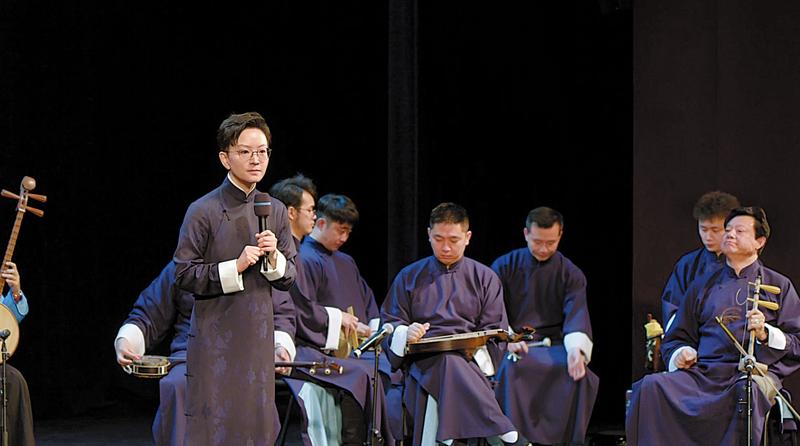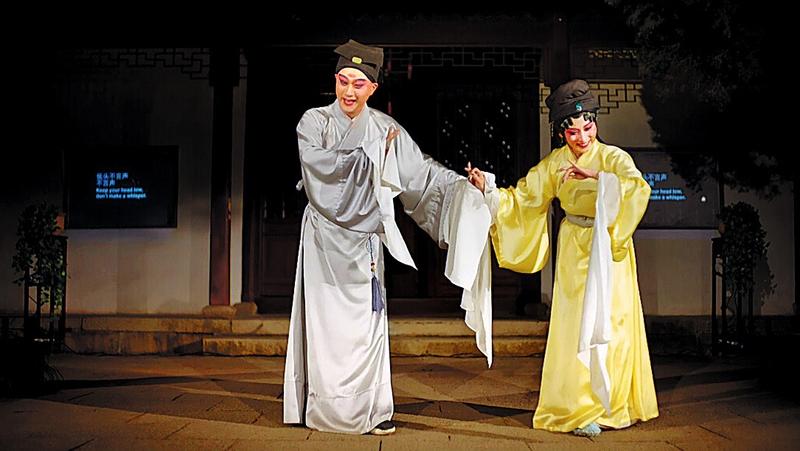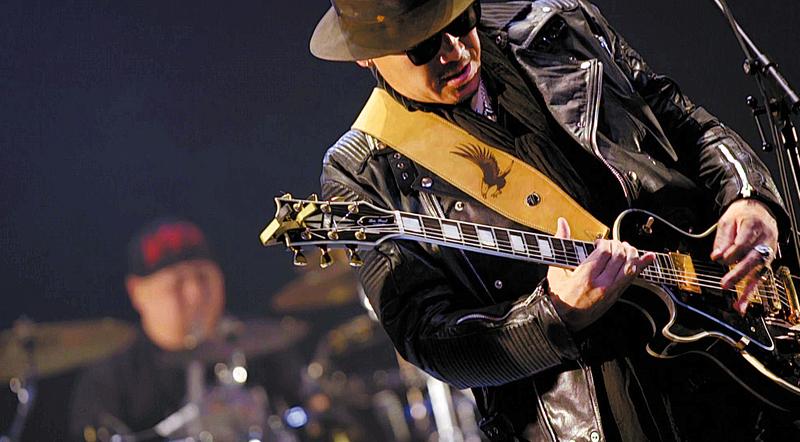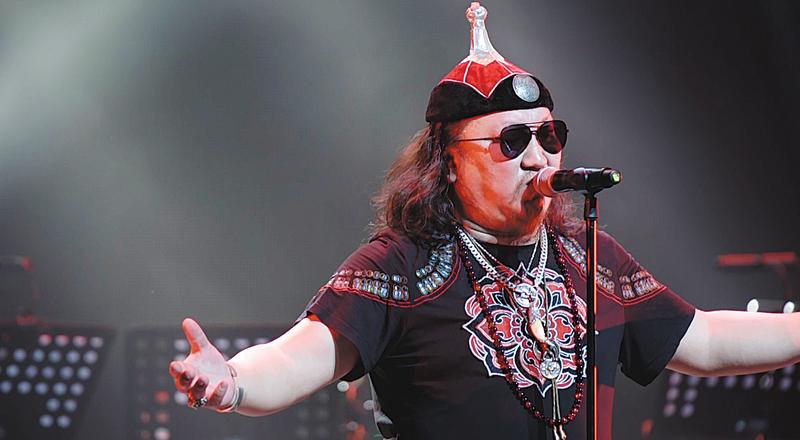Documentary chronicles the participants and their passion for China's myriad onstage art forms, Chen Nan reports.
 Wang Peiyu, who specializes in playing laosheng (old male) roles, is one of the most popular Peking Opera actresses. She features in the China on Stage documentary, which premiered on Bilibili in June. (PHOTO PROVIDED TO CHINA DAILY)
Wang Peiyu, who specializes in playing laosheng (old male) roles, is one of the most popular Peking Opera actresses. She features in the China on Stage documentary, which premiered on Bilibili in June. (PHOTO PROVIDED TO CHINA DAILY)
The coronavirus pandemic has led to a new set of challenges for the performing arts industry. In a time of social distancing, theaters and artists are finding new ways to engage with audiences and practice their craft.
Amid the pandemic, a creative team consisting of members from China and the United Kingdom traveled to a number of Chinese cities and visited more than 20 Chinese artists, despite the difficulties, to make a documentary highlighting the country's performing arts scene.
The documentary offers them a glimpse of Chinese music, dance and theater, which they may have not had the chance to explore before.
Gu Xinying, a producer of the documentary
On June 15, the four-part documentary, titled China on Stage, premiered on Bilibili, a popular Chinese video platform, attracting over one million viewers in its first day.
Through its four episodes-The Songs of China, The Sound of China, How China Moves and The Theater of China-the documentary, which broadcasts weekly, features a variety of performing arts, from the 600-year-old Kunqu Opera to the latest virtual pop star Luo Tianyi, as well as introducing Chinese artists and their backstage stories.
In the first episode, two bilingual hosts of the documentary, Jeff Crosby, who has been working in the Chinese arts and culture scene for a decade, and Chinese-Dutch actress Hsu Li-Tong, take the audience to visit artists. This includes Wang Peiyu, one of the most popular Peking Opera actresses, who specializes in playing laosheng (old male) roles and has been credited with popularizing Peking Opera among younger people, Hanggai, a Chinese rock band formed by ethnic Mongolian musicians, members of the Shanghai Symphony Orchestra and Shanghai Rainbow Chamber Singers.
 A scene from the immersive Kunqu Opera production, Six Records of a Floating Life. (PHOTO PROVIDED TO CHINA DAILY)
A scene from the immersive Kunqu Opera production, Six Records of a Floating Life. (PHOTO PROVIDED TO CHINA DAILY)
The second episode features Chinese musicians and their instruments, including Feng Mantian and his ruan, a Chinese plucked-string instrument with a history of more than 2,000 years, flute soloist Ding Xiaokui, and pianist Niu Niu, whose real name is Zhang Shengliang.
A diversity of dance forms, including traditional Chinese dance, ballet, and street dance, are introduced in the third episode, featuring interviews with dancers from the National Ballet of China, contemporary dancer Hu Shenyuan and folk dancer Dong Jilan from the Bai ethnic group.
In the last episode, audiences will learn about Chinese theater, from musicals, one of the most popular art forms in the country, to ancient shadow plays. Popular musical singer, Ayanga, and renowned composer Guo Wenjing, are among the interviewees sharing their stories.
"Theater is so alive and visceral. It's a face-to-face kind of thing. When the team traveled around China to conduct interviews over the past year, we were impressed by the artists and the ways that they connect people," says Gu Xinying a producer of the documentary, which was co-produced by China Intercontinental Communication Center, a leading Chinese documentary company headquartered in Beijing.
"The artists featured in the documentary represent China's current performing arts scene. For audiences in China and abroad, the documentary offers them a glimpse of Chinese music, dance and theater, which they may have not had the chance to explore before," Gu adds.
The documentary premiered on the BBC's World News channel in February, around the time of China's Spring Festival, the biggest traditional celebration of the year.
 Yilalata, the guitarist of ethnic Mongolian rock band Hanggai on stage. (PHOTO PROVIDED TO CHINA DAILY)
Yilalata, the guitarist of ethnic Mongolian rock band Hanggai on stage. (PHOTO PROVIDED TO CHINA DAILY)
Since members of the UK documentary team couldn't travel to China due to the coronavirus pandemic, the preparation and shooting process involved lots of online discussions.
"We had a great team in China who were able to research, obtain information and film everything. We worked together on who we included, subject to people's availability, so each program has a nice variety of contributors," says London-based director Matthew Tucker. "I felt it was important to find artists who had something to say, were passionate about what they do and willing to let us get up close and personal so we really understood where they were coming from as performers."
Tucker has enjoyed a long career making arts documentaries in the UK. He made a documentary about Chinese pianist Lang Lang back in 2007, during which he took his first trip to China.
"I could sense then the enormous excitement growing around China's performing arts scene. I am delighted to actually make series about it a decade later," he adds.
He mentions that he was moved by lots of the stories the artists told in the documentary, particularly those of the father and daughter who produce a dynamic puppet theater story in Shaanxi province and the immersive theater performance Six Records of a Floating Life in Suzhou, Jiangsu province.
Back in 2015, the CICC and the BBC made and released an earlier documentary titled Chinese New Year: The Biggest Celebration on Earth, which has gone viral in China.
"I've been working in the performing arts industry for nearly 20 years and this documentary introduces a diverse and passionate group of artists in China. Some of them are adapting Western art forms into Chinese productions, while the others are keeping the old Chinese arts tradition and work hard to connect with contemporary audiences," says producer Zhang Bo, who works with Bilibili, a co-producer of the documentary.
 The band's lead vocalist Hurizha. (PHOTO PROVIDED TO CHINA DAILY)
The band's lead vocalist Hurizha. (PHOTO PROVIDED TO CHINA DAILY)
Zhang brought international artists to China for cultural exchange programs before he became a documentary producer. He says that for foreign audiences, art is a great way to learn and understand a country.
"Even a Chinese audience member who may be familiar with the art forms and artists will gain a fuller picture after watching the documentary and be inspired to go to the theaters to enjoy the arts themselves," says Zhang.
"Chinese artists are building diversity in the performing arts scene. It means being engaged in attracting audiences, creating engagement, and using technology," says Xiao Yan, producer of a Kunqu Opera production, Six Records of a Floating Life, adapted from the classic book by Shen Fu, a writer and painter from the Qing Dynasty (1644-1911).
Premiering in 2018, the play has garnered a large fan base with its innovative presentation which sets performers against the backdrop of Canglang Pavilion in Suzhou, a place with a history dating back to the Song Dynasty (960-1279). The play opened to around 50 audience members and allowed them to enjoy the show in a garden as an immersive experience.
The production was featured in the documentary.
"We've produced four versions and will stage the fifth version, with new arrangements of lighting effects and designs, which will allow audiences to have a natural view of the garden while enjoying the show," says director Hu Hanchi, who was born and raised in Hangzhou, Zhejiang province, and was introduced to Kunqu Opera by his parents, both of whom were performers at the Zhejiang Peking Opera and Kunqu Opera Art Theater.
The young director, who is also a fan of hip-hop music, has created stage productions rooted in traditional Chinese operas, including his second production, A Box, at the Avignon Festival, an annual arts festival held in the French city.
"The enduring value of China's performing arts allows us to be creative, with bold ideas. What we do is to get our ideas out there and to reach audiences," says Hu.
Contact the writer at chennan@chinadaily.com.cn


